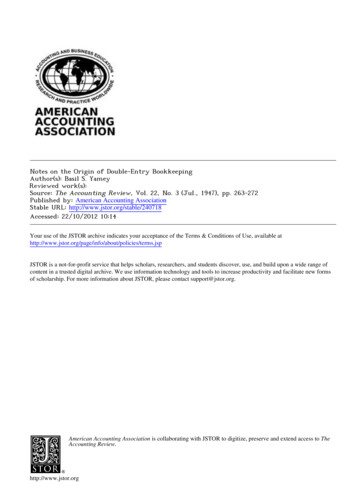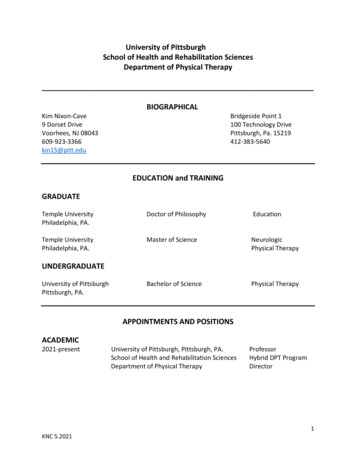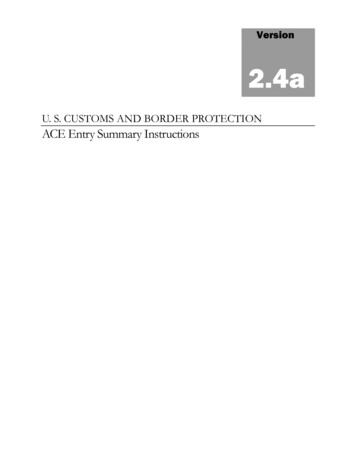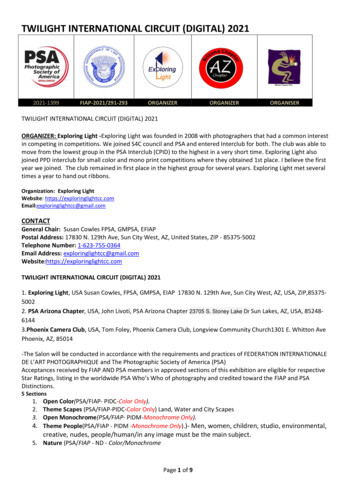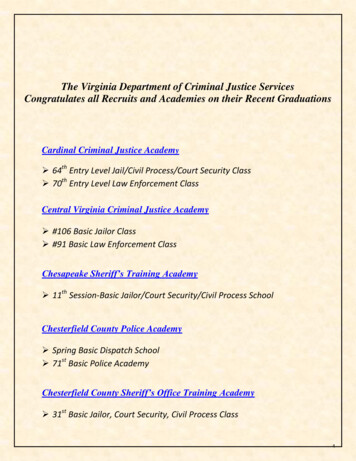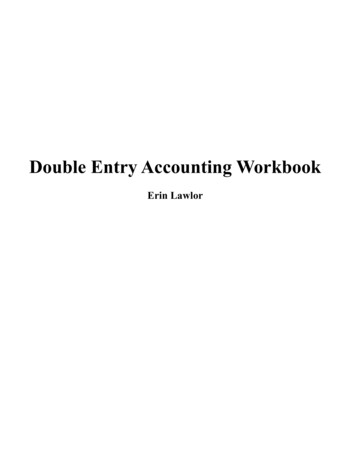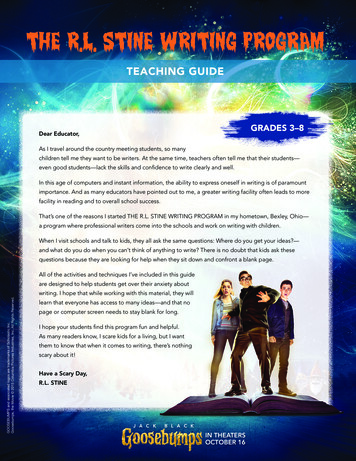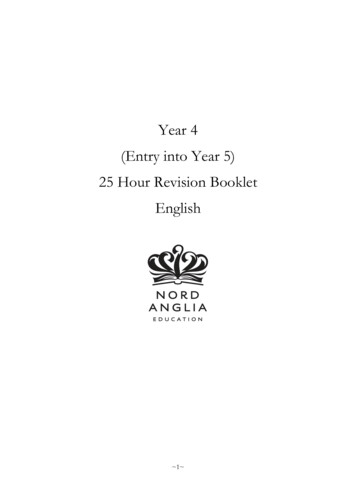
Transcription
Year 4(Entry into Year 5)25 Hour Revision BookletEnglish 1
This page was intentionally left blank 2
SummaryThe activities for English are intended to provide scaffolding and support for pupils, developingknowledge, understanding, and skills as they progress through the booklets. While the activities areindeed labelled as 'comprehension' or 'composition' tasks, these vary significantly as they progress,and build upon knowledge and skills conveyed in earlier stages of each booklet.All booklets have been developed in line with curriculum content from the 'Department ofEducation English Programme of Study for Key Stage 1 and 2 of the National Curriculum inEngland'.In all cases the work has been structured to build upon what has been addressed in previoussections of each booklet, ensuring that pupils develop both skills and understanding as they progress.Where tasks have been repeated, the content has been changed to ensure on-going interest,while reinforcing knowledge and skills.The initial comprehension exercises focus on developing pupils' reading skills, specifically:word reading; and comprehension. These seek to expose pupils to a wide range of writing, including:'fiction and non-fiction to develop their knowledge of themselves and the world they live in, toestablish an appreciation and love of reading, and to gain knowledge across the curriculum' (NationalCurriculum).Specifically pupils are made familiar with different genres: children's literature, moral tales,historical novels, American literature, political biography, fairy tale, fables, anthropomorphic writing,and nonsense stories.Reading comprehension exercises seek to ―increase pupils‘ vocabulary‖ as well as fosteringcreativity, imagination and a love of reading.The use of English section seeks to develop pupils writing skills, focussing in the twofollowing skills, as set out within the national curriculum: transcription (spelling and handwriting);and composition (articulating ideas and structuring them in writing).This focuses on a range of activities including: problem solving, identifying word meaning,use of new vocabulary, prefixes (dis, mis, un, re, anti, auto), identifying prefixes, planning, plotdevelopment, character development, location, introductions, use of apostrophes in contraction andpossessive contexts, and active and passive voice.Composition exercises seek to build on the skills developed within the use of English, anddraw on the knowledge gained within the composition exercises:Empathetic writing skills are also developed, including: life writing, dialogue and interviews,structuring prose - continuation, letter writing, biography, horror, anthropomorphic writing,descriptive writing, autobiography, and practical writing. All of these exercises are in keeping with therequirements of the National Curriculum. 3
Comprehension and Composition 1Learning ObjectiveThe initial comprehension exercises focus on developing pupils' reading skills, specifically:word reading; and comprehension. These seek to expose pupils to a wide range of writing,including: 'fiction and non-fiction to develop their knowledge of themselves and the world theylive in, to establish an appreciation and love of reading, and to gain knowledge across thecurriculum' (National Curriculum). Additional lessons are given in the identification of nouns,verbs, and adjectives, and their use in the English language. 4
Comprehension Task – 1 HourOnce on a dark winter's day, when the yellow fog hung so thickand heavy in the streets of London that the lamps were lightedand the shop windows blazed with gas as they do at night, an oddlooking little girl sat in a cab with her father and was driven ratherslowly through the big thoroughfares.She sat with her feet tucked under her, and leaned againsther father, who held her in his arm, as she stared out of thewindow at the passing people with a peculiar old-fashionedthoughtfulness in her big eyes.She was such a little girl that one did not expect to see such alook on her small face. It would have been an old look for a childof twelve, and Sara Crewe was only seven. The fact was, however,that she was always dreaming and thinking odd things and couldnot herself remember any time when she had not been thinkingthings about grown-up people and the world they belonged to.She felt as if she had lived a long, long time.At this moment she was remembering the voyage she hadjust made from Bombay with her father, Captain Crewe. She wasthinking of the big ship, of the Lascars passingRead the extract from A Little Princess below, and answer thequestions. 5
silently to and fro on it, of the children playing about onthe hot deck, and of some young officers' wives who usedto try to make her talk to them and laugh at the things shesaid.Principally, she was thinking of what a peculiar thingit was that at one time one was in India in the blazing sun,and then in the middle of the ocean, and then driving in astrange vehicle through strange streets where the day wasas dark as the night. She found this so puzzling that shemoved closer to her father.‗Papa,‘ she said in a low, mysterious little voice whichwas almost a whisper, ‗papa.‘‗What is it, darling?‘ Captain Crewe answered, holdingher closer and looking down into her face. ‗What is Sarathinking of?‘A Little Princess, Frances Hodgson Burnett 6
Read the passage above carefully and then answer thequestions. Remember to write your answers in full sentences,taking care with spelling and punctuation.QuestionsMarks1. What is the weather like in London?32. How old is Sara Crewe?13. Who is travelling with her?14. What does Sara Crewe look like?35. What does the word 'puzzling' mean? Look at the word inthe text to help you.16. Did Sara Crewe live in India? Use words from the text tosupport your answer.17. Why does Sara 'move closer to her father'?38. What is Captain Crewe like as a person? Look at the wayhe speaks to Sara.49. 'What is Sara thinking of?' Write down what Sara must bethinking and feeling. Use your imagination to help you.8Total 25 marksWrite your answers in the space below: 7
8
9
10
11
12
Use of EnglishSpelling – 1 hourLook at the following sentences.scrambled.In each sentence one word isUnscramble the word and write it in its correct form in thespace provided. In each case the first letter is in the correctplace.Ex. I don't want to go to bed now, it's too elray.1.I didn't eat the whole cake I only ate one.qteruar.2.The eahtr is the third planet from the sun.3.Tomorrow is my birthday; I will be ehtig yearsold.4.I like to cycle; I ride my bciycle everywhere.5.Everyone knows that actor; he's very fmousa.6.The month after January is called Fberuray.7.I like to stay healthy by eating lots of furit andvegetables.8.I want to biuld a sandcastle on the beach.9.My teacher gave me an answer to myqeustoin.10.In science we do exepirmnets 13 early
Now use these ten unscrambled words to make sentences ofyour own. Make sure you are spelling every word correctly.Check words in a dictionary if you are unsure.1.2.3.4.5. 14
6.7.8.9.10. 15
Look at the following words taken from 'A Little Princess' and selecttheir correct meaning from the list of options.Circle the correct option.Key:(n) noun(v)verb (adj) 1. Voyage (n)a) An old personb) A long trip by the seac) A planet2. Peculiar (adj)a) Strangeb) Tallc) Pretty3. Fog (n)a) A stormb) A thick cloudc) A fire4. Vehicle (n)a) A type of drinkb) An old shoec) A thing used for transport 16 adjective
Check your answers in a dictionary.Now write four sentences that include these four new words.1.2.3.4. 17
Task: Choose eight of the words you have just learnt how tospell and include them in a short story. The title of this story is'Moving House'. Write between 150 and 200 words.Write your answer on the lines below. 18
19
Composition Task – 1 HourSara Crewe is being sent to a girls' boarding school in London. She willno longer be able to live with her father but will instead be living withthe other girls at the school.Imagine you are Sara Crewe on the day that your father has saidgoodbye and left you at your new school. First, write downyour thoughts and feelings as bullet points in the space below. 20
Now write down notes about the good points and bad points ofgoing to a boarding school. 21
Now, writing as Sara Crewe, give a full account of your first dayat the new school. Try to include some of the new spellings youlearnt in the 'Use of English' section.25 marks are available for each answer and an additional 10 marks forthe quality of vocabulary, syntax, spelling and punctuation. 22
23
Comprehension and Composition 2Learning ObjectiveBuilding on previous lessons, pupils are asked to practice their comprehension andcomposition skills in an engaging way, and in different formats. Additional lessons are given inthe identification and use of common prefixes in the English language. 24
Comprehension Task – 1 HourRead the extract from The Happy Prince below, and answer thequestions.High above the city, on a tall column, stood the statue ofthe Happy Prince. He was gilded all over with thin leavesof fine gold, for eyes he had two bright sapphires, and alarge red ruby glowed on his sword-hilt.He was very much admired indeed. ‗He is asbeautiful as a weathercock,‘ remarked one of the TownCouncillors who wished to gain a reputation for havingartistic tastes; ‗only not quite so useful,‘ he added, fearinglest people should think him unpractical, which he reallywas not.‗Why can‘t you be like the Happy Prince?‘ asked asensible mother of her little boy who was crying for themoon. ‗The Happy Prince never dreams of crying foranything.‘‗I am glad there is someone in the world who is quitehappy,‘ muttered a disappointed man as he gazed at thewonderful statue.‗He looks just like an angel,‘ said the Charity Childrenas they came out of the cathedral in their bright scarletcloaks and their clean white pinafores. 25
‗How do you know?‘ said the Mathematical Master,‗you have never seen one.‘‗Ah! but we have, in our dreams,‘ answered thechildren; and the Mathematical Master frowned and lookedvery severe, for he did not approve of children dreaming.The Happy Prince, Oscar Wilde 26
Read the passage above carefully and then answer thequestions. Remember to write your answers in full sentences,taking care with spelling and punctuation.QuestionsMarks1. What does the Happy Prince look like?32. Where does the Happy Prince stand?13. Why does the mother want her son to be like the HappyPrince?14. What do the people of the city think of the HappyPrince?35. What are the 'Charity children' wearing?16. Why do you think the 'Mathematical Master' does not'approve of children dreaming'?37. What things can the Happy Prince see as he stands on histall column overlooking the city? Use your imagination tohelp you.38. Do you think the 'Happy Prince' is happy? Why? Whynot?49. Imagine that you are a statue. Where would you like tostand? Overlooking a park, a city or somewhere else?Would you enjoy being a statue? Why? Why not?6Total 25 marksWrite your answers in the space below: 27
28
29
30
31
32
Use of EnglishPrefixes – 1 hourMost prefixes are added to the start of words without any change to themeaning. 'dis', 'mis' and 'un' are added to words to give a negativemeaning, though there are some exceptions.E.g., disagree, misuse and unfair.Add either ‗mis‘, ‗dis‘ or ‗un‘ to the following calculate9.appear5.spell10.takenUse a dictionary to find three more words with each prefixdismis 33 un
More prefixesre – means 'again', e.g., reappearanti - means 'against', e.g., antisocialauto – means 'self', e.g., autobiographyAdd 're', 'anti', and 'auto' to the following ld4.live9.call5.maton10.ageingIf you are not sure of the meanings of any of these words look them upin a dictionary. 34
Task: Write ten sentences. Each sentence must include one ofthe prefixed words from above:1.2.3.4.5. 35
6.7.8.9.10. 36
Re-read the Happy Prince. Can you spot any prefixed words?Write down a list of the prefixed words you find on the linesbelow. 37
Composition Task – 1 HourImagine meeting the 'Happy Prince' and having a conversation with himabout his life on top of the column, overlooking the city. Whatquestions would you like to ask him?Write down six questions on the lines below:1.2.3.4.5.6. 38
Now use these questions to write an interview between you andthe 'Happy Prince.‘ Try to include some of the prefixed wordfrom the 'Use of English' section.E.g., Interviewer: So what do you look at all day, when you'restanding on top of that column?Happy Prince: I watch the birds flying around my head and thepeople walking on the streets below.Write your interview on the lines below.25 marks are available for each answer and an additional 10 marks forthe quality of vocabulary, syntax, spelling and punctuation. 39
40
41
42
43
Comprehension and Composition 3Learning ObjectiveComprehension and composition tasks in this section are designed to challenge pupils, withlessons given in the proper structuring of prose in storytelling, as well as the use anddescription of setting. 44
Comprehension Task – 1 HourRead the extract from The Railway Children below, and answerthe questions.They were not railway children to begin with. They werejust ordinary suburban children, and they lived with theirFather and Mother in an ordinary red-brick-fronted villa,with coloured glass in the front door, a tiled passage thatwas called a hall, a bath-room with hot and cold water,electric bells, French windows, and a good deal of whitepaint, and 'every modern convenience', as the house-agentssay.There were three of them. Roberta was the eldest. Ofcourse, Mothers never have favourites, but if their MotherHAD had a favourite, it might have been Roberta. Nextcame Peter, who wished to be an Engineer when he grewup; and the youngest was Phyllis, who meant extremelywell.Mother did not spend all her time in paying dull callsto dull ladies, and sitting dully at home waiting for dullladies to pay calls to her. She was almost always there,ready to play with the children, and read to them, and helpthem to do their home-lessons. Besides this she used towrite stories for them while they were at school, and readthem aloud after tea, and she always made up funny piecesof poetry for their 45
birthdays and for other great occasions, such as thechristening of the new kittens, or the refurnishing of thedoll's house, or the time when they were getting over themumps.These three lucky children always had everything theyneeded: pretty clothes, good fires, a lovely nursery withheaps of toys, and a Mother Goose wall-paper. They had akind and merry nursemaid, and a dog who was calledJames, and who was their very own. They also had a Fatherwho was just perfect—never cross, never unjust, andalways ready for a game—at least, if at any time he wasNOT ready, he always had an excellent reason for it, andexplained the reason to the children so interestingly andfunnily that they felt sure he couldn't help himself.You will think that they ought to have been veryhappy. And so they were, but they did not know HOWhappy till the pretty life in the Red Villa was over and donewith, and they had to live a very different life indeed.The Railway Children, E. Nesbit 46
Read the passage above carefully and then answer thequestions. Remember to write your answers in full sentences,taking care with spelling and punctuation.QuestionsMarks1. What does the children's house 'The Red Villa' look like?Use words from the text to support your answer.42. Who is the eldest of the children?13. Who would be mother's favourite if she had a favourite?14. . What does Peter want to be when he grows up?15. Describe the children's mother. What is she like? Useyour own words.46. What is the meaning of the word 'dull'? Read the word inthe text to help you.17. Why are they described as 'lucky' children? Do you thinkthey are 'lucky'?48. What is their dog called?19. How would you describe your house and family? Try towrite a detailed description about your family life like theone you have just read.8Total 25 marksWrite your answers in the space below: 47
48
49
50
51
52
Use of EnglishStory writing – 1 hourSometimes it is useful to begin with a story 'skeleton' before you write astory. A story 'skeleton' is a basic outline of what is going to happen inyour story.E.g. A mouse called Tom gets lost in an underground tunnel. Hegets chased by a huge rat but manages to escape. Later, he meets ablack beetle who tells him the way out of the tunnel.Here you are given the main characters in the story (Tom, a rat, abeetle), the location (an underground tunnel) and what happens (gettinglost, getting chased, and escaping).Try to write story skeletons these story ideas:1. A giant, an ant, a castle, making friends. 53
2. A leopard, a sheep, an island, being scared.3. A boy, a bear, a forest, hunting. 54
4. An old woman, a cat, a cottage, something magical. 55
Now you are going to invent your own story. First you need todecide on the characters: what they look like and how theybehave.Character 1:Character 2: 56
Character 3:Location – Where is the story set? Try to describe it in as muchdetail as possible 57
What happens? What are the main events in the story? Try toinclude no more than three events. 58
Now write the first few paragraphs of your story.between 150 and 200 words. 59 Write
60
Composition Task – 1 HourAt the end of the passage it says:'they did not know HOW happy till the pretty life in the Red Villawas over and done with, and they had to live a very different lifeindeed.'Think about how the family's life might change and what might causethe change.Write bullet points on the lines below:Do you think the children will be happy when their lives change? Why?Why not? Imagine their thoughts and feelings at being told they are nolonger able to live in the Red Villa.Write them down on the lines below. 61
Now that you know that something changes for the children write downthe next part of the story. Use your bullet points and your imaginationto help you. Refer back to the 'Use of English' section on 'story writing'if you get stuck.Write your answer in the space below:25 marks are available for each answer and an additional 10 marks forthe quality of vocabulary, syntax, spelling and punctuation. 62
63
64
65
66
67
Comprehension and Composition 4Learning ObjectiveFurther reinforcement and practice of comprehension, composition, and creative writing skillsare given, in addition to lessons on the proper use of apostrophes for both contractions andpossessives. 68
Comprehension Task – 1 HourRead the extract from Little Men, below, and answer thequestions.When Nat went into school on Monday morning, hequaked inwardly, for now he thought he should have todisplay his ignorance before them all. But Mr. Bhaer gavehim a seat in the deep window, where he could turn hisback on the others, and Franz heard him say his lessonsthere, so no one could hear his blunders or see how heblotted his copybook. He was truly grateful for this, andtoiled away so diligently that Mr. Bhaer said, smiling, whenhe saw his hot face and inky fingers:‗Don't work so hard, my boy; you will tire yourselfout, and there is time enough.‘‗But I must work hard, or I can't catch up with theothers. They know heaps, and I don't know anything,‘ saidNat, who had been reduced to a state of despair by hearingthe boys recite their grammar, history, and geography withwhat he thought amazing ease and accuracy.‗You know a good many things which they don't,‘ saidMr. Bhaer, sitting down beside him, while Franz led a classof small students through the intricacies of themultiplication table. 69
‗Do I?‘ and Nat looked utterly incredulous.‗Yes; for one thing, you can keep your temper, andJack, who is quick at numbers, cannot; that is an excellentlesson, and I think you have learned it well. Then, you canplay the violin, and not one of the lads can, though theywant to do it very much. But, best of all, Nat, you reallycare to learn something, and that is half the battle. It seemshard at first, and you will feel discouraged, but plod away,and things will get easier and easier as you go on.‘Little Men, Louisa May Alcott 70
Read the passage above carefully and then answer thequestions. Remember to write your answers in full sentences,taking care with spelling and punctuation.QuestionsMarks1. Does 'ignorance' mean being: a) tired b) uninformed or c)sad?12. Where is Nat allowed to sit in the classroom?23. Why does Nat feel that he must work hard?44. According to Mr Bhaer what does Nat know that theother pupils don't? Use words from the text to supportyour answer.45. What encouragement does Mr Bhaer give Nat? Do youthink it is good advice?36. Look at the second word in bold in the text. Does'incredulous' mean a) disbelieving, b) nervous c)frightened.17. Describe Nat's character using three adjectives. Try touse your own words.48. What advice would you give Nat to help him improve athis school work? Write down three pieces of advice.19. Imagine you are Nat's teacher, write a school reportabout his work and behaviour during the year.5Total 25 marks 71
Write your answers in the space below: 72
73
74
75
76
Use of English – ApostrophesWrite the following words out as contractions with the use ofapostrophes.Ex. I will not1.I do not2.I should not.3.I must not4.I have5.I am6.I was not7.I did not.8.I could not9.I am not10. I should have11.You are not.12.You did not13.You could not.14.You are15.You were not16.She does not.I won‘t 77
17. He is not.18.They are not.19.He was not20.We are not 78
Apostrophes can also be used to show possession.E.g., That girl owns a bike that is the girl's bike.Read the following sentences and then write them out againusing an apostrophe which indicates possession.Ex. The leaves of the tree.1.The bicycle of the boy2.The house of the family3.The car of the man.4.The club of the women.5.The team of the footballers.6.The schools of the children.7.The petals of the flowers.8.The chair of Chris.9.The computers of theclassrooms.10. The ideas of the girl.The tree's leaves. 79
Now write about what your family and friends own usingpossessive apostrophes. E.g. Matthew's family owns a red car.Write between 150 and 200 words. 80
81
Composition Task – 1 HourWhat are your favourite subjects at school?Write them down on the lines below.Write in detail about what you do on a normal school day. Startwith what time you arrive, what subjects you are taught, whattime you go for lunch etc.Use the table below to help organise your ideas.Before school IWhen I arrive at school IIn the morning we learnWe have lunch atIn the afternoon we studySchool ends at 82
Now write a letter to a new pupil who is just about to start at yourschool telling them what your timetable is like and what subjects theycan expect to study. Make sure your use of apostrophes is correct.Refer to the 'Use of English' section on 'apostrophes' to make sure.Write your letter on the lines below:25 marks are available for each answer and an additional 10 marks forthe quality of vocabulary, syntax, spelling and punctuation. 83
84
Comprehension and Composition 5Learning ObjectiveComprehension and composition tasks in this section are designed to challenge previouslytaught skills to ensure skill development, and an additional section is included on theidentification and use of the active and passive voices in composition. 85
Comprehension Task – 1 HourRead the extract from The Child's Book of American Biography,below, and answer the questions.Abraham was born in Kentucky and lived in that State withhis parents and his one sister until he was eight years old.The Lincolns were very, very poor. They lived in asmall log cabin on the banks of a winding creek. They neednot have been quite so poor, but the truth of the matter isthat Mr. Thomas Lincoln, Abraham's father, was lazy. Tobe sure he fastened a few logs together for shelter, cut alittle wood, and dug up some ground for a garden. Butafter the corn and potatoes were planted, they neverreceived any care, and there is no doubt the family wouldhave gone hungry many a day if Abraham had not hurriedhome with fish which he caught in a near-by stream, or ifMrs. Lincoln had not taken her rifle into the woods andshot a deer or a bear. The meat from these would last forweeks, and the skins of animals Mrs. Lincoln always savedto make into clothes for the children.Thomas Lincoln could not read or spell, and as nearas I can find out, was not a bit ashamed of it, either. Buthis wife, Nancy Hanks Lincoln, was a fair scholar andtaught Abraham and his sister, Sarah, to read and spell. 86
There was no floor to the Lincoln's log cabin and nofurnishings but a few three-legged stools and a bed madeof wooden slats fastened together with pegs. Abraham andSarah slept on piles of leaves or brush.Slates and pencils were scarce, and Abraham used tolie before the fire when he was seven or eight years old,with a flat slab of wood and a stick which he burned at oneend till it was charred; then he formed letters with it on thewood. In that way he taught himself to write.The Child's Book of American Biography, Mary Stoyell Stimpson 87
Read the passage above carefully and then answer thequestions. Remember to write your answers in full sentences,taking care with spelling and punctuation.QuestionsMarks1. Where was Abraham Lincoln born?12. Why were the family so poor?13. How would you describe Abraham's father? Use yourown words to answer this question.14. Why did the family not go hungry?25. Could Abraham's father read and write? Use words fromthe text to support your answer.46. Who taught Abraham to read and write? What did he useinstead of slates and pencils?17. What were the children's clothes made out of?48. Did Abraham have a difficult childhood? Write downreasons why he did and reasons why he didn't. You canuse evidence from the text to support your ideas.39. Write about your life so far. Try to remember precisedetails as in the extract you have just read.8Total 25 marks 88
Write your answers in the space below: 89
90
91
92
93
Use of EnglishThe Active and Passive Voice – 1 hourThe active voice is created with subject, verb, and object.E.g. Lions eat antelope.In the passive voice the subject becomes the object and receives theaction of the verb.E.g. Antelopes are eaten by lions.The passive voice is used when we want to make the object moreimportant and when we do not necessarily want to know who isperforming the action (the subject).These sentences are written in the active voice. Change thesesentences to the passive.1. The fireman put out the fire.2. The river flooded the village. 94
3. The men chased the dogs away.4. The criminals threatened an old lady.5. The team won the championship.6. Thieves stoles my handbag7. Artists painted the city centre. 95
8. Gangs vandalised the park.Now turn these passive sentences into active sentences.some cases you may need to add a subject.In1. The orchestra was praised by the teacher.2. A cat was found in the sewer.3. A child was rescued from the burning building.4. An alarm was raised when it was discovered that the jewels hadbeen taken 96
5. The post was delivered late.6. The elephant was captured.Now write a newspaper report about an accident that hashappened on the motorway or in another location. Try to writethis report in the passive voice. Write between 150 and 200words. 97
98
Composition Task – 1 HourThe passage on Abraham Lincoln's early life is called a biography. Abiography is a piece of writing about someone else. Biographies havebeen written about politicians, singers, actors and sport's personalities.Think about someone you admire, it could be an actor a singer or amember of your family.Write down six adjectives that describe him/her on the linesbelow.1.2.3.4.5. 99
6.Now write bullet point about six interesting things that havehappened in the life of your chosen person.1.2.3.4.5.6. 100
Task: Write your biography out in full. Remember to make use of theadjectives and bullet points that you have written in the two previoustasks.Write your answers in the space below: 101
102
103
104
105
106
Comprehension and Composition 6Learning ObjectiveComprehension and composition skills, building on previous lessons, are further developedhere in a challenging and engaging way, giving pupils the chance to develop their creative andautobiographical writing skills. 107
Comprehension Task – 1 HourRead the extract from The Princess and Curdie below, and answerthe questions.Curdie was the son of Peter the miner. He lived with hisfather and mother in a cottage built on a mountain, and heworked with his father inside the mountain.A mountain is a strange and awful thing. In old times,without knowing so much of their strangeness andawfulness as we do, people were yet more afraid ofmountains. But then somehow they had not come to seehow beautiful they are as well as awful, and they hatedthem,—and what people hate they must fear. Now that wehave learned to look at them with admiration, perhaps wedo not always feel quite awe enough of them. To me theyare beautiful terrors.I will try to tell you what they are. They are portionsof the heart of the earth that have escaped from thedungeon down b
Reading comprehension exercises seek to ―increase pupils‘ vocabulary‖ as well as fostering creativity, imagination and a love of reading. The use of English section seeks to develop pupils writing skills, focussing in the two following skills, as set out within the natio

